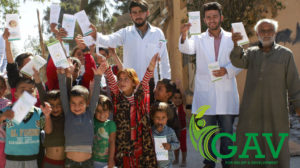GAV’s Health Campaign for the IDPs in Al Tabqa

The itinerant medical team of GAV’s organization for relief and development carried out a special health awareness activity for the displaced in Al Tabqa city located in the rural of Alraqqa, northern Syria, which had witnessed violent battles against the Islamic State (ISIS).
The service infrastructure, especially the health sector, such as the hospitals, has been severely damaged, leading to a significant decline in the health service condition since its liberation from ISIS.
The awareness campaign launched by GAV’s organization in Al Tabqa city included the distribution of 300 brochures on mine prevention and protection ways from infectious diseases among children, as well as health guidance to prevent fetal malformations.
The campaign targeted displaced children and women who run away from their areas to the city of Al Tabqa because of the fighting in the region during the last period.
The health activities have been organized just after the distribution of awareness brochures, by GAV’s the medical team, to the city’s residents living in the cultural center, which was heavily destroyed by the fighting, and hosts, although the basic conditions of life, dozens of displaced people who didn’t find other places to live, but this is an exceptional circumstance in the region in general.
The health activity included as well, detailed information and explanations about the themes of the campaign, with 45 people, women and children, attending.
Ayaz Mohammed, the medical program director at GAV, contributed lectures using a slide show and supported by pictures and videos of each idea, in order to communicate information to the audience in an interactive manner.
The first lecture was devoted to talking about the ways of preventing mines, their forms, types, and possessions that can be left to individuals and the community, in the midst of a remarkable interaction by the participants, because most of Alraqqa’s area is facing imminent danger due to mines and improvised explosive devices left behind by the fighters of ISIS, in addition to a lot of remnants of war left in the residential areas.
Based on a simple health guidelines to ensure their safety, the second lecture was dedicated to the protection of children and prevent them against infectious diseases. The lecturer provided, mothers and children, explanations focusing on infection methods, health guidelines to avoid infection and the role of the family in raising children’s awareness and encouraging them to pay attention to hygiene standards, in particular.
The lecture leaded to an interactive dialogue between the participants and the team about the appropriate hygiene methods and the importance of removing the accumulated garbage from the cultural center, as it could be a source which spread of diseases and spread among children, and how to sterilize the wounds when it occurs to avoid infections and prevent the spread of germs in addition to discussing the health methods in preparing food and protection ways under the exceptional circumstances experienced by the displaced.
The last topic in the health activity was on protection ways helping to prevent fetal abnormalities among women who are planning to be pregnant. The lecturer explained to the participants the causes of fetal malformations, types of pervasive abnormalities such as rabbit lip, Down syndrome, the opening of the coronary arteries, and health guidelines about the prevention of taking place in the fetus.
At the end of the activity, GAV’s team distributed the pamphlets to the audience and to other displaced persons in the city’s ruined clinics.
The participants expressed their desire to support the displaced with such health awareness activities because of the exceptional situations they are going through. They expressed as well, the need to provide medical services and health care for children, especially in the winter, due to the severe shortage of basic services, foodstuffs and hygiene tools, especially with the absence of programs which could be done by humanitarian organizations to cover service shortages in various areas.
It is important to note that the health awareness initiative of GAV’s medical team was carried out in cooperation with the organization of “Early Intervention Team”, who provided equipment and logistical assistance in the processing of the activity hall.
